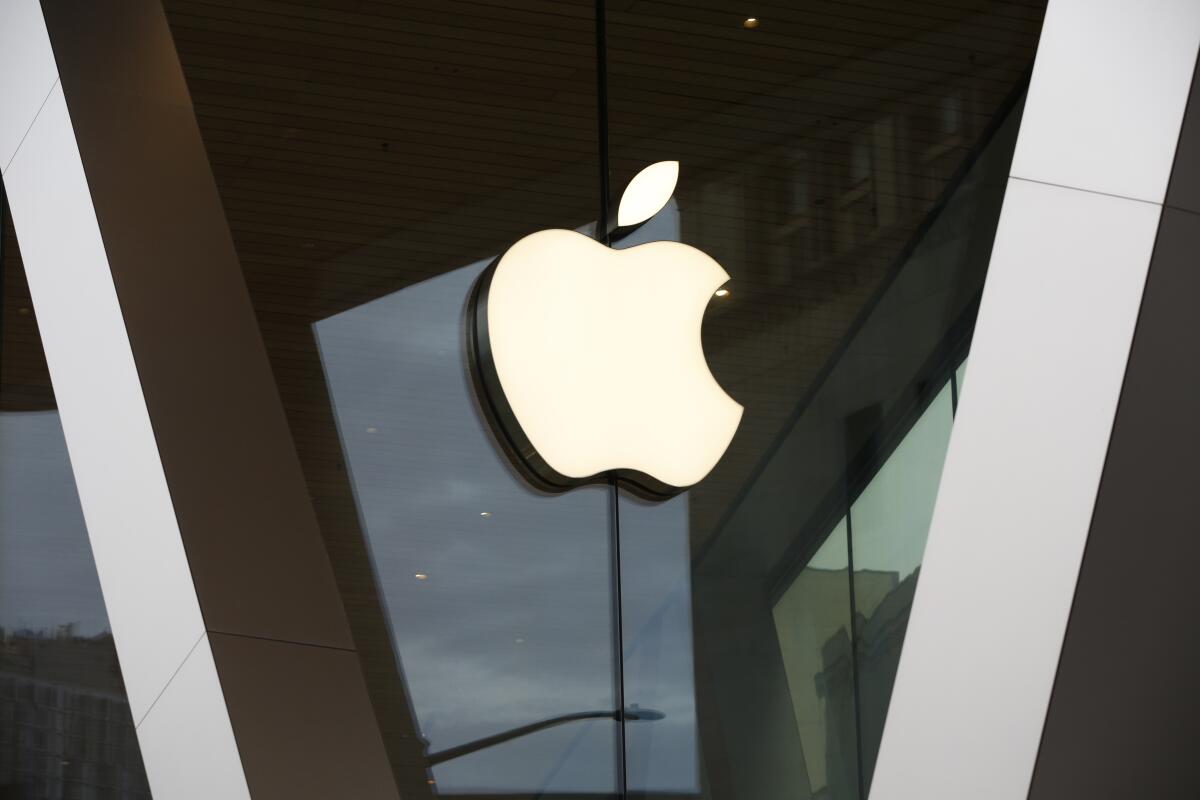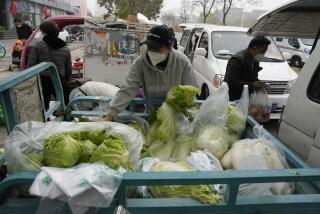Apple iPhone Pro production shortfall estimated at 6 million units amid China tumult

- Share via
Turmoil at Apple’s key manufacturing hub of Zhengzhou, China, is likely to result in a production shortfall of close to 6 million iPhone Pro units this year, according to a person familiar with assembly operations.
The situation remains fluid at the plant and the estimate of lost production could change, the person said, asking not to be named discussing private information. Much will depend on how quickly Foxconn Technology Group, the Taiwanese company that operates the facility, can get people back to assembly lines after violent protests against COVID-19 restrictions. If lockdowns continue in the weeks ahead, production could be further set back.
Apple’s shares fell 2.6% to $144.22 in New York on Monday, marking the biggest one-day drop in more than two weeks. They have declined 17% so far this year.
The Zhengzhou campus has been racked by lockdowns and worker unrest for weeks after COVID infections left Foxconn and the local government struggling to contain the outbreak. Thousands of staff fled in October after chronic food shortages, only to be replaced by new employees who rebelled against pay and quarantine practices.
The Foxconn facility produces the vast majority of iPhone 14 Pro and Pro Max devices, Apple’s most in-demand handsets this year. Those premium phones have picked up the slack for slumping demand for the regular iPhone 14 models. Apple lowered its overall production target to about 87 million units from an earlier projection of 90 million units, Bloomberg News reported.
Apple and Foxconn increased their estimates of the Zhengzhou shortfall over the last two weeks because of growing disruptions, said the person, adding that they expect to be able to make up the 6 million units in lost output in 2023.
Few people realized it at the time, but the world shifted fundamentally a decade ago when Steve Jobs pulled the first iPhone from Apple’s bag of technological tricks.
“It demonstrates that everyone, even Apple, is susceptible to supply chain constraints in China due to COVID,” said Anshel Sag of Moor Insights & Strategy.
The deficit, a significant shortfall for an operation that cranks out tens of millions of iPhones ahead of the peak holiday season, ranks among the more bearish of analysts’ expectations. Morgan Stanley analysts earlier this month also estimated the iPhone Pro model shortfall at about 6 million units this year, though that was before the outbreak of violence in Zhengzhou last week.
Apple and Foxconn didn’t immediately respond to requests for comment.
The tumult in iPhone City, as the Zhengzhou complex is known, is a stark reminder of the risks for Apple’s vast supply chain in China. Foxconn endeavored to quell protests — largely driven by new hires arriving at Zhengzhou and rejecting onerous COVID controls — by offering a bonus to any workers choosing to return home. Over the weekend, it added a bonus of as much as $1,800 per month for full-time employees staying at the factory through December and January.
The highly visible and unusual protests in Zhengzhou aggravated an already challenging business environment. The enormous complex hosts as many as 200,000 workers during peak iPhone production season. More than 20,000 new hires are reported to have left after the protests.
Apple disclosed serious security vulnerabilities for iPhones, iPads and Macs that could potentially allow attackers to take complete control of these devices.
The departure of new workers is less of a factor in production than the quarantines imposed on existing employees because of their experience and skill, another person familiar with assembly operations said. Foxconn is actively recruiting additional employees, with help from government officials. The Taiwanese company, China’s largest private-sector employer, has years of experience hiring assembly personnel by the tens of thousands, particularly during peak season.
Apple and Foxconn, also known as Hon Hai Precision Industry Co., said earlier this month, without providing specifics, that shipments of its newest premium iPhones will be lower than previously expected because of China’s lockdowns.
Morgan Stanley’s analysts also worked through a worst-case scenario for Apple and Foxconn, in which the Zhengzhou facility couldn’t ship any iPhones for the rest of the year. That would result in a 20% shortfall in expected sales for Hon Hai in the current quarter, analysts led by Sharon Shih wrote in the research note Nov. 7.
Amir Anvarzadeh, an analyst with Asymmetric Advisors, said it can’t be helped that Apple and Foxconn will take a hit from China’s COVID policies. The situation is likely to encourage them to seek out alternative manufacturing locations, such as India and Vietnam, he said.
“It will force Apple to accelerate the diversification of its production base,” he said.
More to Read
Inside the business of entertainment
The Wide Shot brings you news, analysis and insights on everything from streaming wars to production — and what it all means for the future.
You may occasionally receive promotional content from the Los Angeles Times.












